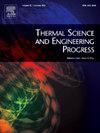带太阳辐射机制的非牛顿模型中熵优化时变混合纳米流体的热液性能研究
IF 5.1
3区 工程技术
Q2 ENERGY & FUELS
引用次数: 0
摘要
热传递的有效管理在提高热系统的性能方面起着至关重要的作用,特别是在可再生能源应用中,如太阳能热系统。本研究利用悬浮在水中的氧化镁(MgO)和氧化锌(ZnO)纳米颗粒作为基液,在非牛顿模型中研究了熵优化、时间依赖的混合纳米流体的水热性能。采用非牛顿流体模型来模拟流体的流动行为,更能反映复杂流体系统的真实情况。利用相似变量将控制偏微分方程转化为无量纲常微分方程。采用配点法对所得常微分方程进行了求解,并对相应的传热特性和熵产进行了深入分析。结果显示,太阳辐射和磁场参数对流体温度有有利的影响。此外,较高的布林克曼数会导致粘性耗散产生的热量增加,从而增加熵的产生率。研究结果证明了减少熵产生和提高热力学性能的潜力,为太阳能热应用和其他热交换技术中节能系统的设计提供了重要的启示。本文章由计算机程序翻译,如有差异,请以英文原文为准。

Insight into the hydrothermal performance of entropy-optimized time-dependent hybrid nanofluid flow in a non-Newtonian model with solar radiation mechanisms
The efficient management of heat transfer plays a crucial role in enhancing the performance of thermal systems, particularly in renewable energy applications such as solar thermal systems. This study investigates the hydrothermal performance of entropy-optimized, time-dependent hybrid nanofluid flow in a non-Newtonian model, utilizing Magnesium Oxide (MgO) and Zinc Oxide (ZnO) nanoparticles suspended in water as the base fluid. A non-Newtonian fluid model is employed to simulate the flow behavior, reflecting more realistic conditions for complex fluid systems. Similarity variables are used to transform the governing partial differential equations (PDEs) into dimensionless ordinary differential equations (ODEs). The resulting ordinary differential equations are solved using the collocation numerical technique, and the corresponding heat transfer characteristics and entropy generation are thoroughly analyzed. The results, presented both in tabular and graphical formats, show that solar radiation and magnetic field parameters favorably influence the fluid temperature. Additionally, a higher Brinkman number leads to enhanced heat generation from viscous dissipation, which subsequently increases the rate of entropy production. The findings demonstrate the potential to reduce entropy generation and improve thermodynamic performance, offering important implications for the design of energy-efficient systems in solar thermal applications and other heat exchange technologies.
求助全文
通过发布文献求助,成功后即可免费获取论文全文。
去求助
来源期刊

Thermal Science and Engineering Progress
Chemical Engineering-Fluid Flow and Transfer Processes
CiteScore
7.20
自引率
10.40%
发文量
327
审稿时长
41 days
期刊介绍:
Thermal Science and Engineering Progress (TSEP) publishes original, high-quality research articles that span activities ranging from fundamental scientific research and discussion of the more controversial thermodynamic theories, to developments in thermal engineering that are in many instances examples of the way scientists and engineers are addressing the challenges facing a growing population – smart cities and global warming – maximising thermodynamic efficiencies and minimising all heat losses. It is intended that these will be of current relevance and interest to industry, academia and other practitioners. It is evident that many specialised journals in thermal and, to some extent, in fluid disciplines tend to focus on topics that can be classified as fundamental in nature, or are ‘applied’ and near-market. Thermal Science and Engineering Progress will bridge the gap between these two areas, allowing authors to make an easy choice, should they or a journal editor feel that their papers are ‘out of scope’ when considering other journals. The range of topics covered by Thermal Science and Engineering Progress addresses the rapid rate of development being made in thermal transfer processes as they affect traditional fields, and important growth in the topical research areas of aerospace, thermal biological and medical systems, electronics and nano-technologies, renewable energy systems, food production (including agriculture), and the need to minimise man-made thermal impacts on climate change. Review articles on appropriate topics for TSEP are encouraged, although until TSEP is fully established, these will be limited in number. Before submitting such articles, please contact one of the Editors, or a member of the Editorial Advisory Board with an outline of your proposal and your expertise in the area of your review.
 求助内容:
求助内容: 应助结果提醒方式:
应助结果提醒方式:


